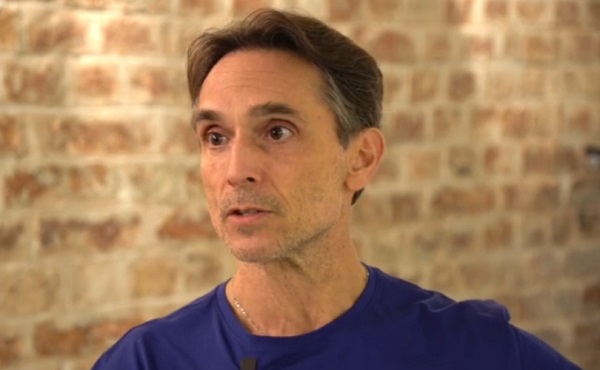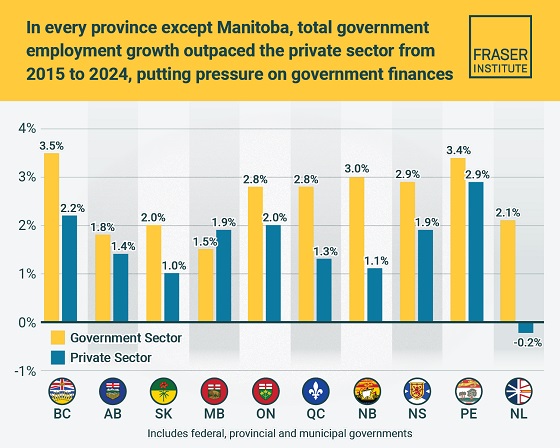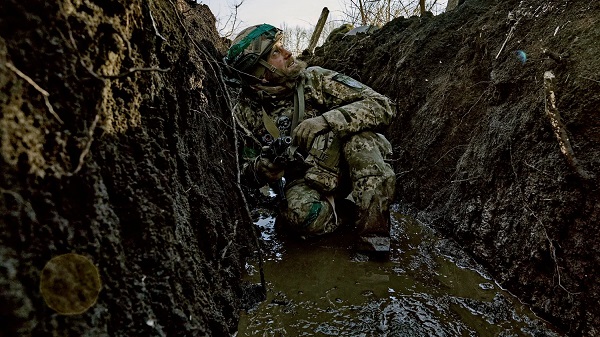COVID-19
Dr. Trozzi appeals revocation of his medical license in ‘existential moment’ for Ontario courts

Dr. Mark Trozzi
From LifeSiteNews
Tuesday, outspoken COVID science critic Dr. Mark Trozzi will appeal a decision to take away his medical license. Due to a new legal standard, a successful outcome may positively impact Canada ‘in all domains of government regulation.’
Medical freedom champion Dr. Mark Trozzi will present his legal case on Tuesday when he appeals the stripping of his medical license in January by the College of Physicians and Surgeons of Ontario (CPSO).
The case will be heard by the Ontario Divisional Court (ODC) and, according to attorney Michael Alexander, a successful result would have far-reaching legal implications impacting freedom of expression rights across “all domains of government regulation,” including all health colleges.
Appearing in a late September interview with Canadian politician Derek Sloan, Alexander explained the history of the case leading up to the revoking of Trozzi’s license on January 25. In their view, “the college was primarily concerned … that Mark had been making statements about COVID-19 science and public policy that amounted to ‘misinformation’ and he was misleading the public and in doing so causing harm.”
It was also relevant that Trozzi was not even in practice at this time but had taken a sabbatical to study these issues more carefully and start a daily newsletter regarding his research.
The concern of CPSO “was the substance of his views,” the attorney assessed, “so they wanted to censor him in some way” and “eventually took him to a discipline hearing where he was found to be unprofessional, incompetent, and in violation of the standard of practice in the profession, primarily because he just presented an alternative point of view.”
READ: Dr. Trozzi stripped of medical license over COVID stance, plans to appeal
Ironically, Trozzi was not able to be present for the interview himself because he was traveling in Japan, with an invitation to speak before its parliament. He had already addressed the Romanian parliament on issues related to the COVID-19 response.
While the highly regarded former emergency room specialist “is a persona non grata in Ontario,” Dr. Trozzi’s attorney observed, “he’s in high demand around the world as someone who is providing important insights into the whole COVID era, COVID science, COVID public policy, and his criticisms are taken very seriously.”
“We have to ask ourselves what the authorities in Ontario are doing when in other parts of the world serious people are taking Dr. Trozzi’s criticisms very seriously,” Alexander proposed.
Trozzi case could impact ‘the country in all domains of government regulation’
For more than three decades, the Ontario Divisional Court has been legally directed to judge such cases only according to a low-threshold standard called “reasonableness” that Alexander describes as the court basically deferring to the judgment of such regulatory tribunals as CPSO with regard to facts, the law, and “particularly on the interpretation of the law that the tribunal adopts.”
What makes this case different is that since Trozzi has a “statute-based right to appeal” and thus a 2019 Supreme Court decision now requires the ODC to adopt a higher standard, referred to as “correctness,” in examining the CPSO decision.
Therefore, according to this new standard, “you must get all findings of fact correct, you must get every interpretation of your statute correct, you must interpret all case law correctly,” Alexander explained.
“So, the CPSO has never had to face this before, and this (case) is the first major fundamental challenge to a regulatory body on this standard of correctness in Ontario,” he continued. Thus, this case is “extremely important. If we were to win, it would affect the whole regulatory framework of the province in a positive way.”
“So these same judges, who have been cutting a lot of slack to the College of Physicians in particular, are now going to be facing similar issues that they have faced before but on this new standard of correctness,” the attorney said. “So they are going to have to adopt a completely different mindset in assessing the case.”
Therefore, “I guess you could say (this is) an existential moment for the judiciary in Ontario,” Alexander proposed. “I mean will the Divisional Court step up to the plate and fully apply the standard of correctness and have the courage to do it?”
According to Alexander, a successful outcome in this case “would have a ripple effect not just in Ontario for the 22 health colleges here but for the health colleges all across the country,” forcing them to reconsider their policies in this regard.
And given the case regards the fundamental freedom of expression, a successful outcome on these arguments “would have an impact across the country in all domains of government regulation.”
“So this is not a case that’s just about Mark,” the attorney clarified. “We are trying to change the way this country is governed, and the college’s case has given us that opportunity.”
In 2020 during the “pandemic,” Trozzi, an ER veteran of 25 years, noticed that the mainstream narrative surrounding the public health “emergency” was deeply flawed. While media reported overflowing emergency rooms, Trozzi’s hospital remained relatively empty. This inspired him to research the science facts of COVID.
In the interest of protecting not only his own patients but people everywhere, Dr. Trozzi promoted alternative COVID-19 treatments and publicly explained why the COVID shot is “not a vaccine.”
In retaliation, Dr. Trozzi was barred from issuing medical exemptions for COVID-19 shots, masking requirements and testing in 2021. He was not alone: Ontario’s Dr. Rochagne Kilian was also similarly barred.
At the time, CPSO said the interim orders were given in accordance with the Regulated Health Professions Act, which allow restrictions on a member’s license if a regulator believes a certain practice “exposes or is likely to expose patients to harm or injury.”
The CPSO has cracked down on numerous physicians who failed to comply with standard protocol during the COVID outbreak. It has done this so assiduously that last year Dr. Robert Malone spoke out against what he described as the “re-education” of dissident Canadian doctors.
The CPSO has thus far initiated legal action against Trozzi and at least five other doctors who are committed to their Hippocratic Oath responsibilities related to COVID: Mary O’Connor, Kilian, Celeste Jean Thirlwell, Patrick Phillips, and Crystal Luchkiw.
Alexander also made clear that while the CPSO has the typical governmental “blank check” of “unlimited resources,” including “around 10 lawyers on staff” and “access to outside council,” he is in need to hire “clerks to do special kinds of filing” and is seeking free-will donations.
Having donated “hundreds of thousands of dollars of billable time” into this case, Alexander has no regrets, stating that “it’s too important to the country not to litigate and we are the ones who pioneered this approach, and so it’s us or nobody.”
To assist Dr. Trozzi in winning his precedent-setting case, please donate here.
COVID-19
Crown seeks to punish peaceful protestor Chris Barber by confiscating his family work truck “Big Red”

The Justice Centre for Constitutional Freedoms announces that the Ontario Court of Justice will hold a hearing at 10:00 a.m. ET on Wednesday, November 26 at 161 Elgin Street, Ottawa, regarding the Crown’s attempt to permanently seize “Big Red,” the 2004 Kenworth long-haul truck relied upon by peaceful Freedom Convoy protestor Chris Barber and his family trucking business.
Constitutional lawyer Diane Magas, who represents Mr. Barber, is opposing the forfeiture.
“The impact of the forfeiture of ‘Big Red’, which is an essential part of the operation of Mr. Barber’s trucking business and is relied upon by Mr. Barber, his family as well as employees, is not what Parliament had in mind when enacting those forfeiture provisions, especially considering the context of a political protest where the police told Mr. Barber where to park the truck and when Mr. Barber moved the truck after being asked to move it,” she said.
Mr. Barber, a Saskatchewan trucker and central figure in the peaceful 2022 Freedom Convoy, depends on this vehicle for his livelihood. The Crown alleges that his truck constitutes “offence-related property.”
The November 26 hearing will address the Crown’s application to seize the truck and will include evidence regarding ownership and corporate title. The Court will also consider an application filed earlier this year by Mr. Barber’s family, who are asserting their rights as interested third parties and seeking to prevent the loss of the vehicle.
Mr. Barber was found guilty of mischief and counselling others to breach a court order following the peaceful Freedom Convoy protest, despite his consistent cooperation with law enforcement and reliance on legal advice during the events of early 2022. At sentencing, the Court acknowledged that he “came with the noblest of intent and did not advocate for violence,” emphasizing that Mr. Barber encouraged calm and compliance.
Mr. Barber said, “‘Big Red’ is how I put food on the table. I followed every instruction police gave me during the protest, and I never imagined the government would try to take the very truck I rely on to earn a living.”
COVID-19
New report warns Ottawa’s ‘nudge’ unit erodes democracy and public trust

The Justice Centre for Constitutional Freedoms has released a new report titled Manufacturing consent: Government behavioural engineering of Canadians, authored by veteran journalist and researcher Nigel Hannaford. The report warns that the federal government has embedded behavioural science tactics in its operations in order to shape Canadians’ beliefs, emotions, and behaviours—without transparency, debate, or consent.
The report details how the Impact and Innovation Unit (IIU) in Ottawa is increasingly using sophisticated behavioural psychology, such as “nudge theory,” and other message-testing tools to influence the behaviour of Canadians.
Modelled after the United Kingdom’s Behavioural Insights Team, the IIU was originally presented as an innocuous “innovation hub.” In practice, the report argues, it has become a mechanism for engineering public opinion to support government priorities.
With the arrival of Covid, the report explains, the IIU’s role expanded dramatically. Internal government documents reveal how the IIU worked alongside the Public Health Agency of Canada to test and design a national communications strategy aimed at increasing compliance with federal vaccination and other public health directives.
Among these strategies, the government tested fictitious news reports on thousands of Canadians to see how different emotional triggers would help reduce public anxiety about emerging reports of adverse events following immunization. These tactics were designed to help achieve at least 70 percent vaccination uptake, the target officials associated with reaching “herd immunity.”
IIU techniques included emotional framing—using fear, reassurance, or urgency to influence compliance with policies such as lockdowns, mask mandates, and vaccine requirements. The government also used message manipulation by emphasizing or omitting details to shape how Canadians interpreted adverse events after taking the Covid vaccine to make them appear less serious.
The report further explains that the government adopted its core vaccine message—“safe and effective”—before conclusive clinical or real-world data even existed. The government then continued promoting that message despite early reports of adverse reactions to the injections.
Government reliance on behavioural science tactics—tools designed to steer people’s emotions and decisions without open discussion—ultimately substituted genuine public debate with subtle behavioural conditioning, making these practices undemocratic. Instead of understanding the science first, the government focused primarily on persuading Canadians to accept its narrative. In response to these findings, the Justice Centre is calling for immediate safeguards to protect Canadians from covert psychological manipulation by their own government.
The report urges:
- Parliamentary oversight of all behavioural science uses within federal departments, ensuring elected representatives retain oversight of national policy.
- Public disclosure of all behavioural research conducted with taxpayer funds, creating transparency of government influence on Canadians’ beliefs and decisions.
- Independent ethical review of any behavioural interventions affecting public opinion or individual autonomy, ensuring accountability and informed consent.
Report author Mr. Hannaford said, “No democratic government should run psychological operations on its own citizens without oversight. If behavioural science is being used to influence public attitudes, then elected representatives—not unelected strategists—must set the boundaries.”
-

 Alberta2 days ago
Alberta2 days agoRed Deer’s Jason Stephan calls for citizen-led referendum on late-term abortion ban in Alberta
-

 espionage2 days ago
espionage2 days agoSoros family has been working with State Department for 50 years, WikiLeaks shows
-

 Indigenous2 days ago
Indigenous2 days agoIndigenous activist wins landmark court ruling for financial transparency
-

 Artificial Intelligence22 hours ago
Artificial Intelligence22 hours agoGoogle denies scanning users’ email and attachments with its AI software
-

 Business1 day ago
Business1 day agoIs affirming existing, approved projects truly the best we can do in Canada?
-

 MAiD1 day ago
MAiD1 day agoHealth Canada suggests MAiD expansion by pre-approving ‘advance requests’
-

 Business1 day ago
Business1 day agoTaxpayers paying wages and benefits for 30% of all jobs created over the last 10 years
-

 International1 day ago
International1 day agoTrump closes in on peace in Ukraine






